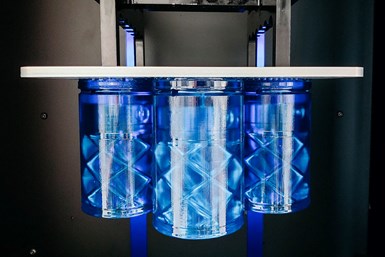Nexa3D, Addifab Partner to Bring Larger, Faster 3D Printed Tooling to Injection Molders
Collaboration focuses on 3D printed injection mold tooling that enables complex geometries compatible with a range of materials.

Freeform injection molding (FIM) enables users to additively manufacture complex injection mold tooling in hours instead of weeks or months. Photo Credit: AddiFab
Nexa3D and AddiFab are joining forces to bring a novel, 3D printed injection mold tooling platform to injection molders. The freeform injection molding (FIM) platform is said to offer a compelling value proposition. Based on 3D printing technology, the FIM process enables users to additively manufacture complex injection mold tooling in hours instead of weeks or months.
These FIM tools are compatible with most thermoplastic materials, including reinforced high-performance feedstocks, the company says. They can also be dissolved, which enables the molding of complex components that would otherwise be difficult — or even impossible — to mold with conventional metal tooling.
“Injection molding is a complex process and the tool building is the most complex part of the process,” says Lasse Staal, AddiFab co-founding CEO. “With freeform injection molding, we provide injection molders with a fully transparent set of tools (no pun intended) that will allow them to fast-track tool designs and validations, while raising the bar on tool innovation. Now, we can take these capabilities to the next level by partnering with Nexa3D to broaden access and superpower performance.”
Through this collaboration, Nexa3D will supply its NXE 400 system — including the industrial 3D printer as well as wash and cure units — to users of FIM, while AddiFab will be supplying its proprietary tooling resins and postprocessing equipment.
“I had the opportunity to witness the powerful impact of freeform injection molding for the first time at the RAPID + TCT conference in 2019, and was instinctively intrigued by its potential to reimagine additive tooling,” says Avi Reichental, Nexa3D co-founder, chairman and CEO. “As both Addifab and Nexa3D have since productized and industrialized our respective processes, it became obvious that together we can achieve much more by digitizing injection molding at convincing scale sustainably.”
Nexa3D and AddiFab will showcase this joint solution at the RAPID + TCT show in Detroit, Michigan, May 17-19. The companies are also setting up joint Silicon Valley demostration facilities in Palo Alto, California.
Related Content
-
Understanding PEKK and PEEK for 3D Printing: The Cool Parts Show Bonus
Both materials offer properties desirable for medical implants, among other applications. In this bonus episode, hear more from Oxford Performance Materials and Curiteva about how these companies are applying PEKK and PEEK, respectively.
-
ActivArmor Casts and Splints Are Shifting to Point-of-Care 3D Printing
ActivArmor offers individualized, 3D printed casts and splints for various diagnoses. The company is in the process of shifting to point-of-care printing and aims to promote positive healing outcomes and improved hygienics with customized support devices.
-
Possibilities From Electroplating 3D Printed Plastic Parts
Adding layers of nickel or copper to 3D printed polymer can impart desired properties such as electrical conductivity, EMI shielding, abrasion resistance and improved strength — approaching and even exceeding 3D printed metal, according to RePliForm.














